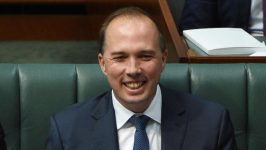Peter Dutton: A Law Unto Himself

Former Solicitor-General Justin Gleeson has warned that Peter Dutton’s growing control over Australian deportation laws is removing important oversight mechanisms offered by the courts and parliament – threatening the separation of powers between the state and judiciary.
Before last October, most would not have known who Justin Gleeson was. Like most Solicitor-Generals before him, Mr Gleeson worked outside of the public eye, providing the government with legal advice on policy and appearing in court on their behalf.
That changed last October, after a controversial directive from Attorney-General George Brandis required government ministers to obtain Brandis’ permission before seeking advice from Mr Gleeson.
Many saw the directive as an attempt to muzzle the Solicitor-General, severely limiting his ability to act as an independent legal adviser to government, particularly on issues where the law might clash with the government’s actions.
The dispute came to end in late October, with Mr Gleeson resigning from his position on the basis that his relationship with the Attorney-General had ‘irretrievably broken down’.
Earlier this year, Mr Gleeson’s ordeal repeated itself, albeit on the opposite side of the world. In January, Donald Trump forced the resignation of acting-US Attorney General Sally Yates, after she refused to enforce his controversial ‘Muslim ban’ as it was against the law.
Politicians attacking democratic institutions
“It would be tempting to think that what is occurring in the United States is merely a passing phase, perhaps it’s no more than an American excess that we can faithfully ignore… I beg to differ” Mr Gleeson stated at this year’s PEN lecture.
“Trump’s attacks on the media, and on basic institutions, should be seen as part of a larger attempt by some in power in various liberal-democracies, including Australia, to shut down one of the most critical aspects of freedom of expression.”
His comments were prescient. Shortly after his speech, three government ministers accused the Victorian Supreme Court of harbouring “extreme-left” “ideological” sentiments when it came to terrorism sentencing. The ministers’ comments were seen by many as an attempt to influence a case that was before the court, threatening the separation of power between the judiciary and government.
Mr Gleeson’s made the comments as part of this year’s PEN Lecture, titled ‘The Threat to Freedom of Expression’. PEN is a worldwide association of writers who advocate for literacy and freedom of expression. Mr Gleeson’s speech focused on threats to freedom of expression in Australia.
“This state of affairs has come about at both state and federal levels, under governments of varying political persuasions, and has no doubt been exacerbated by the difficult demands of national security” he remarked.
Mr Gleeson is particularly concerned about the expansion of discretionary powers to government ministers, allowing them to make important decisions affecting the lives of large numbers of people without parliamentary or judicial oversight.
Why discretionary powers threaten democracy
“Most of the rules that affect our modern life are in fact found in these forms of what I call subordinate legislation, and increasingly this has become the norm over the last 20-30 years”, Mr Gleeson said.
“The free speech issue is how we as a community get to know the range of decisions which ministers are making under these powers, or why the decisions are being made, or whether we need to even be concerned about these decisions.”
“The result is that, firstly, in many cases, Parliament escapes having to take responsibility for the exercise of power; secondly, it’s difficult for our courts to exercise their judicial review function; and thirdly, it becomes very difficult for us as a community to know what has gone on or why, and to engage in informed commentary or criticism of government action.”
Immigration Minister Peter Dutton has been one the biggest beneficiaries of these changes – especially in relation to deportation laws.
A recent report by Liberty Victoria’s Rights Advocacy Project found the Immigration Minister had been granted 47 new discretionary powers – including various discretions to approve, refuse, or cancel visas, to detain or re-detain an asylum seeker without warning, to send asylum seekers to offshore detention centres and, in some cases, prevent reviews of decisions not to grant protection visas.
The expansion of such powers comes with a corresponding dilution of parliamentary, judicial and public oversight – as important decisions are made at the Minister’s whim.
Earlier this year, mother and practising nurse Maria Sevilla – who had been the country nearly a decade – faced deportation because her autistic child had been refused a visa.
At first, Mr Dutton said he would do nothing and the deportation would go ahead in accordance with his directions. ,
Dutton later changed his mind after enormous public pressure, and Ms Sevilla was allowed to remain in Australia. While that was a good outcome, Mr Gleeson says it raises concerns about the transparency of the decision making process, the lack of procedural fairness, lack of court oversight and the desirability of one person having the power to make life-changing decisions at his fingertips,
“How many other cases went by where an unfair or a harsh decision was made with there being no effective way for the community to know or even to protest?” Gleeson asked.
“Parliament should cease delegating core legislative functions to Ministers unless the case to do is overwhelmingly compelling. The norm should be that the law for our country is found in statutes passed, after they have been openly tested and argued over in parliament, and subject to community and media comment.”
“If that means parliament has to sit for more weeks a year or perhaps spend more time debating laws and less time on other activities so be it.”







